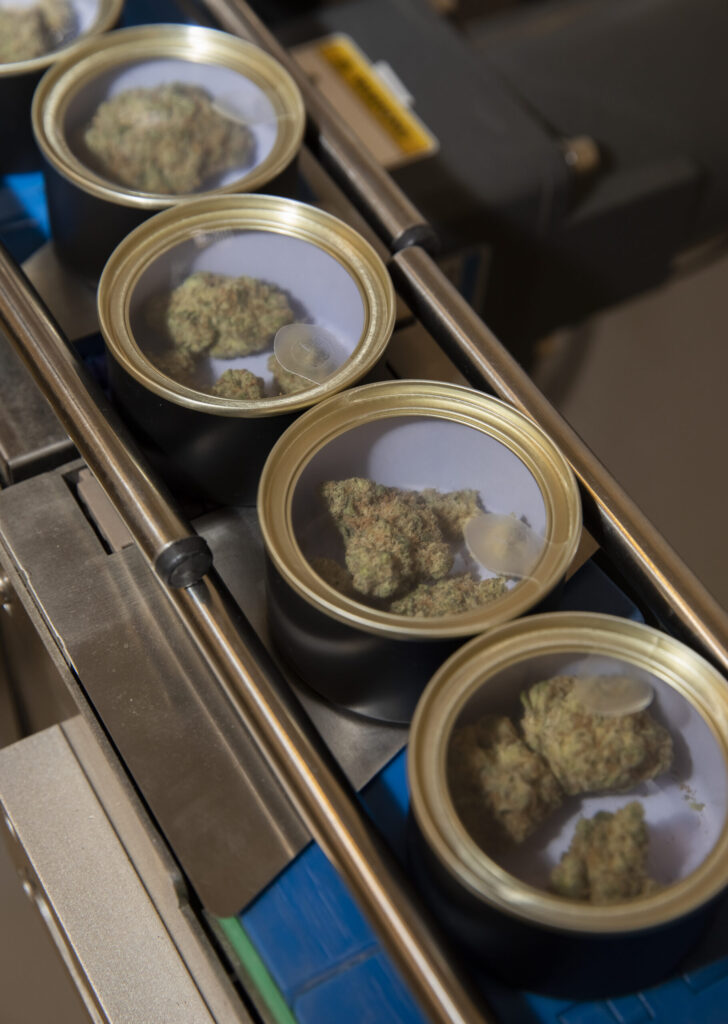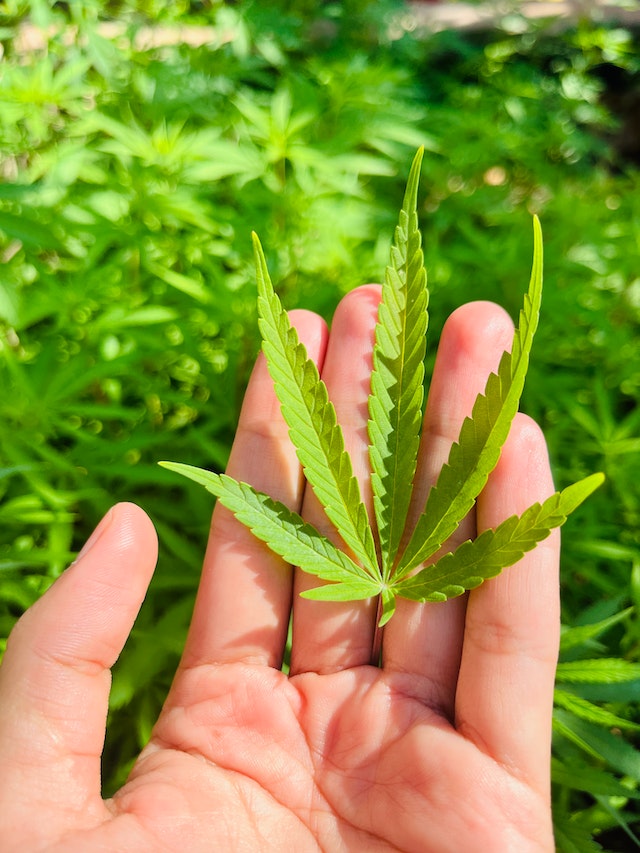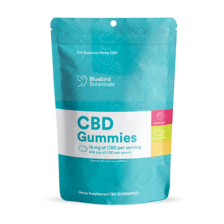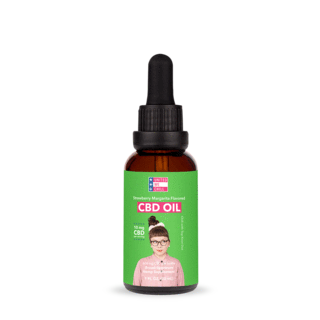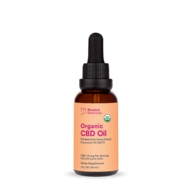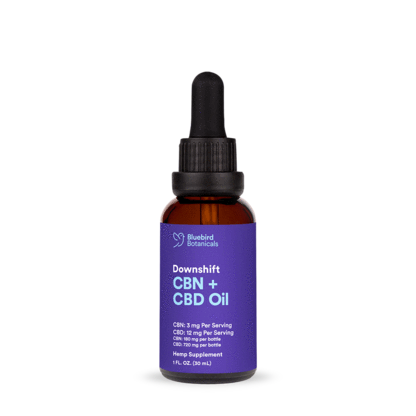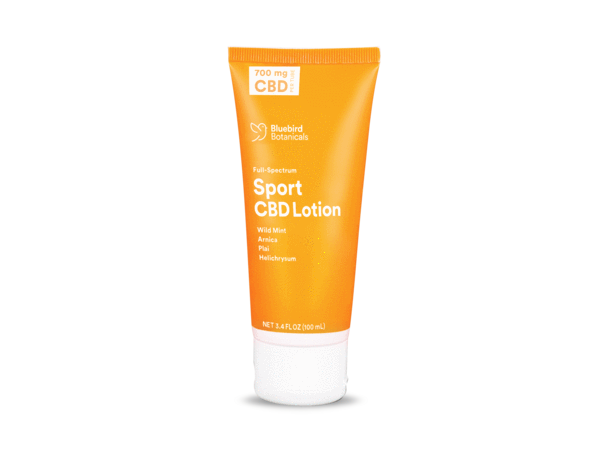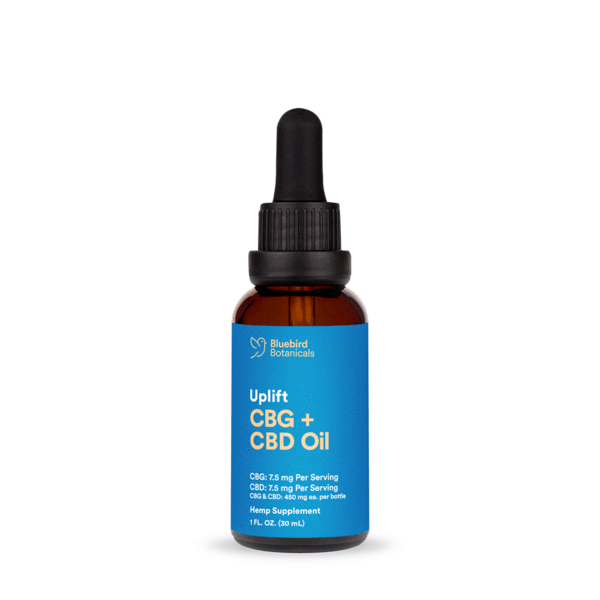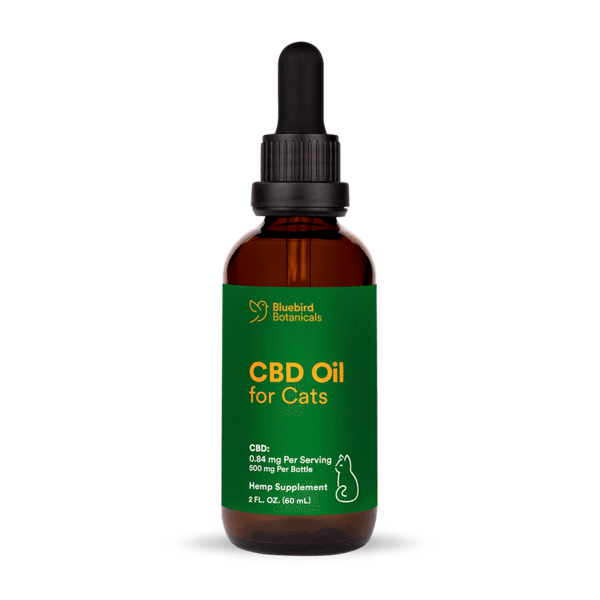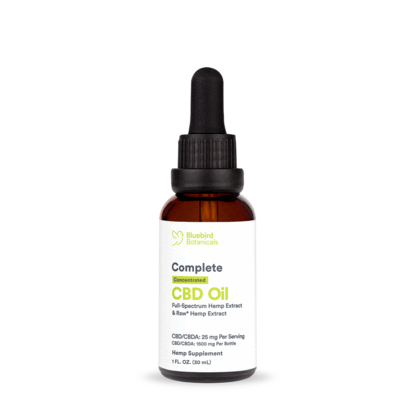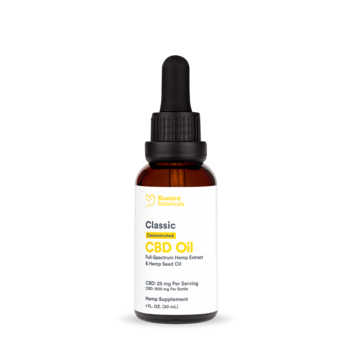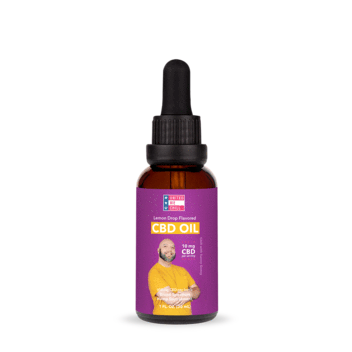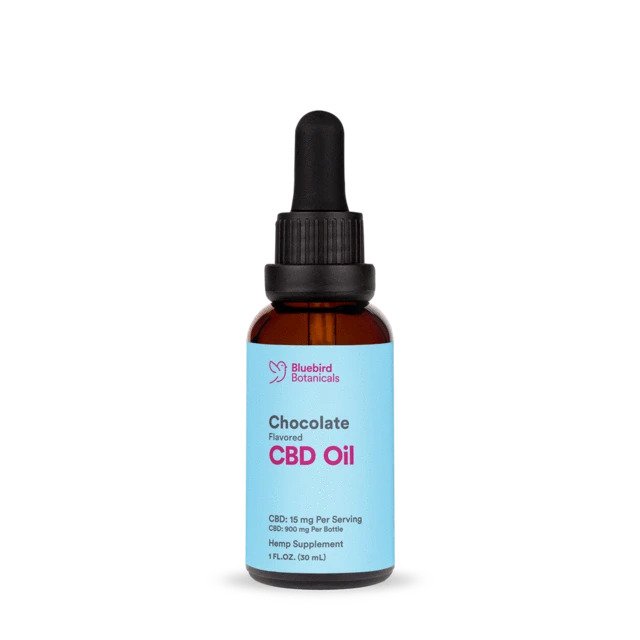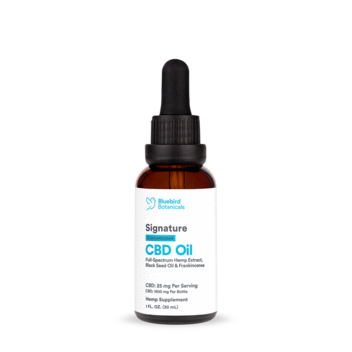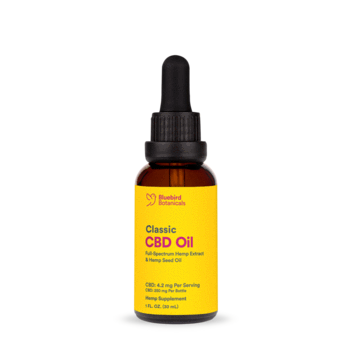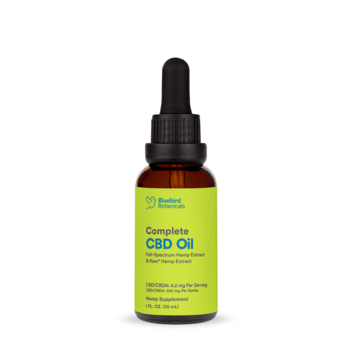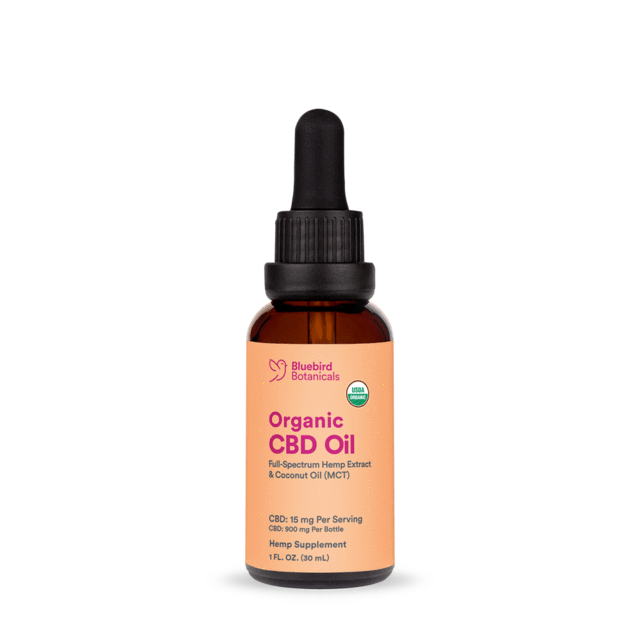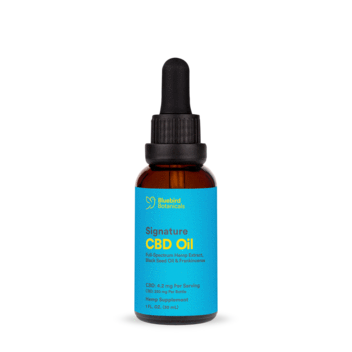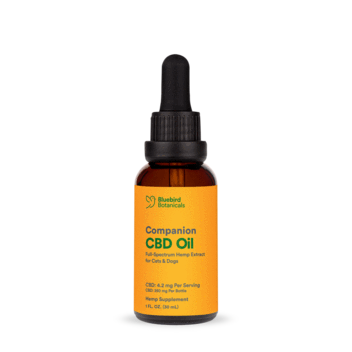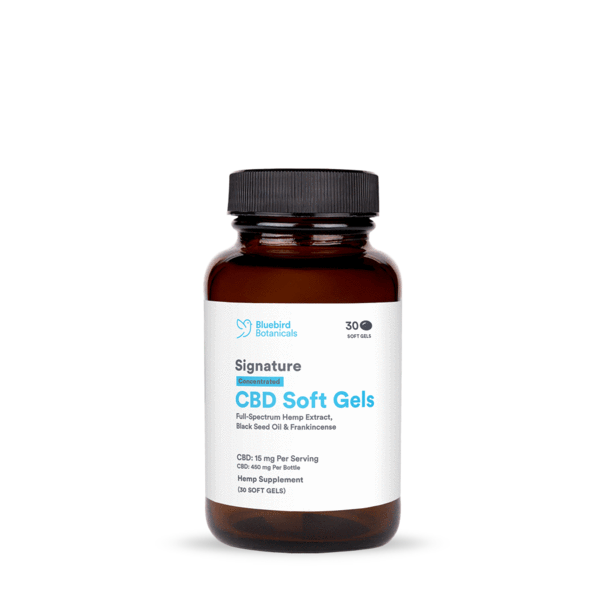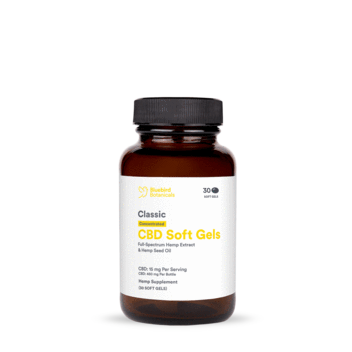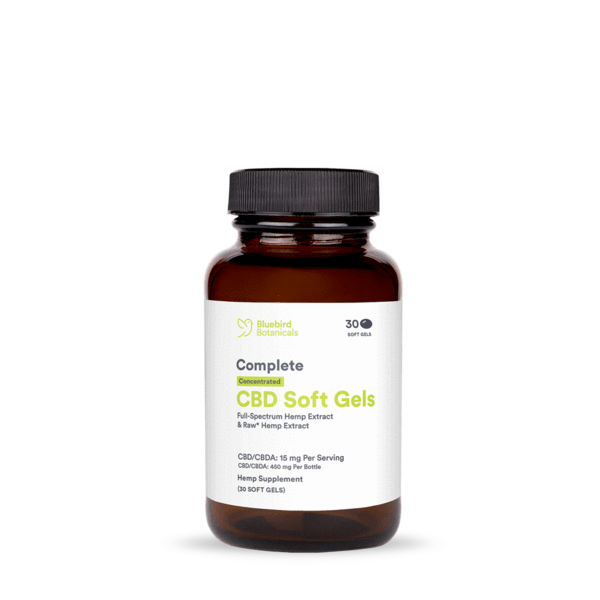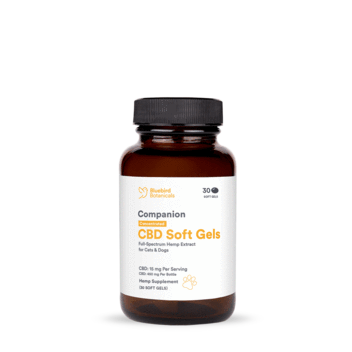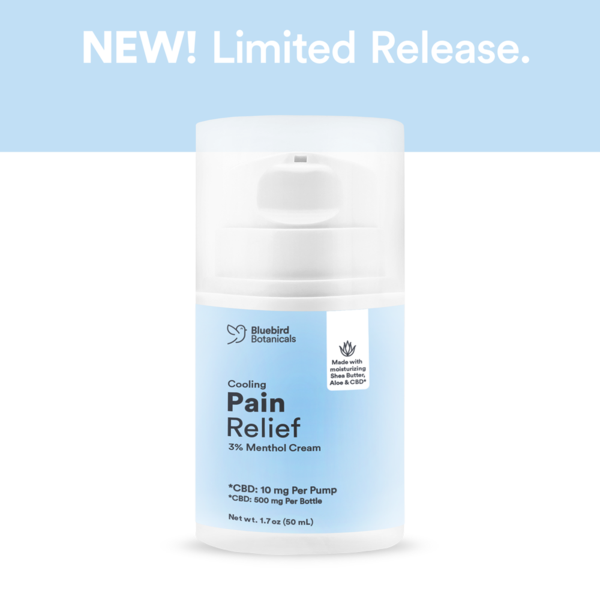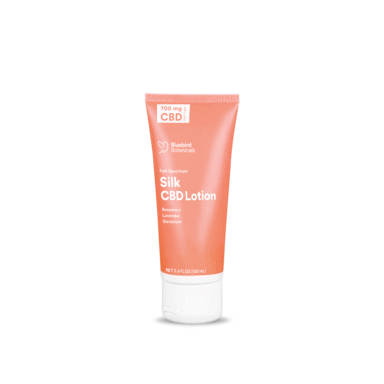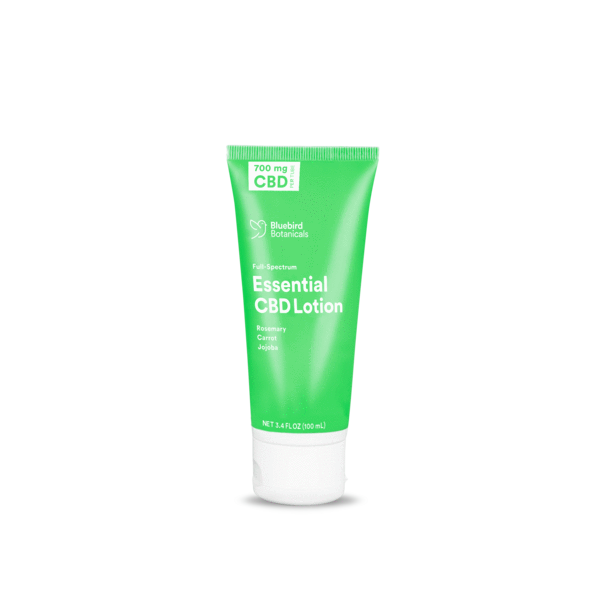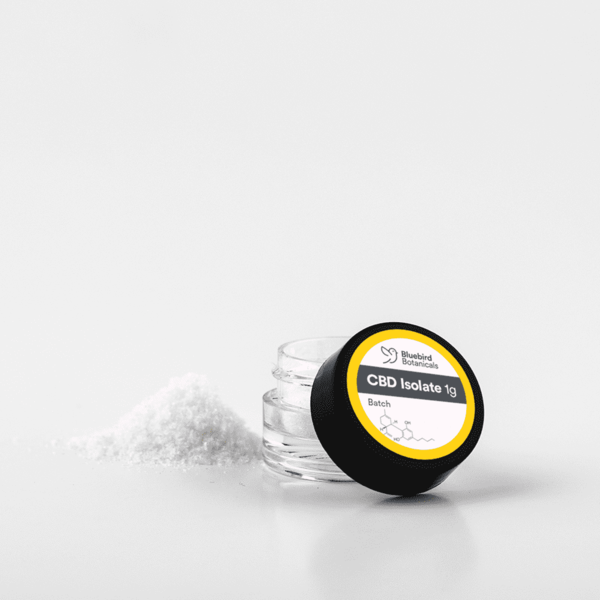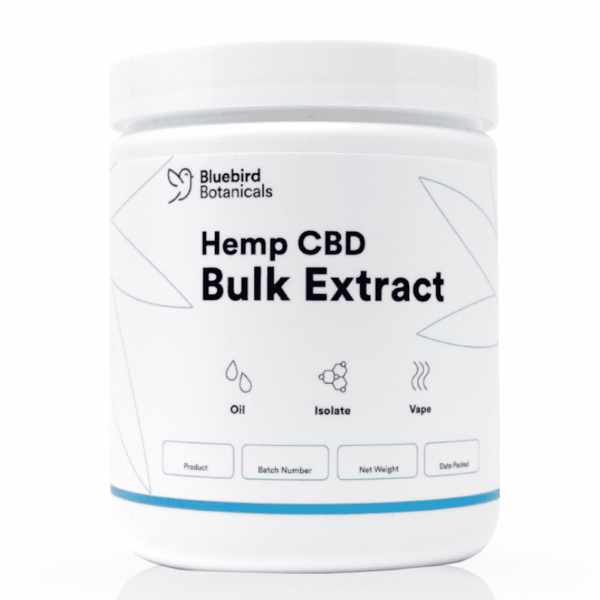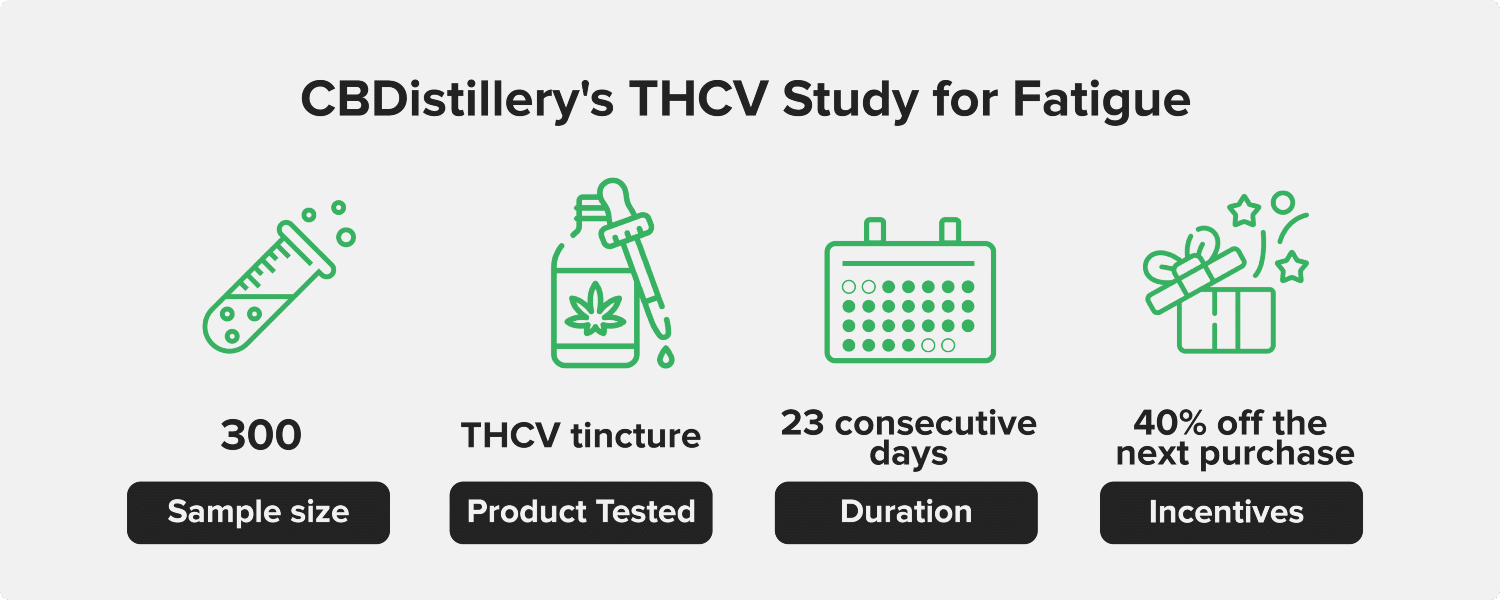Welcome to our Bluebird Botanicals review!
Since well before it was cool, the Bluebird Botanicals team has been formulating hemp-based CBD products, so we figured it’s high time we trained our sights on this well-reputed brand.
After sampling several of their oils, gummies, and topicals over a period of several weeks and speaking with Grace Kaucic, Senior Content & Communications Manager, we’ve arrived at a final score for Bluebird Botanicals.
Our final score for Bluebird Botanicals is 89.5/100.
Speaking of, we use a 27-item assessment to comprehensively grade every brand we review across the following major categories:
- Quality
- Transparency
- Website Experience
- Customer Service
- Value
- Brand Value
For a preview of one of our favorite products from the review, check out these CBD-infused gummies.
Bluebird Botanicals CBD Gummies
Bluebird Botanicals CBD Gummies
These gummies feature a botanically enhanced full-spectrum hemp extract with no artificial sweeteners or preservatives.
Our testers reported feeling grounded after just one dose (of 3-4 gummies).
The best part? They taste amazing, and there are only two grams of added sugar per piece.
Bluebird Botanicals Strawberry Margarita Flavored Broad-Spectrum CBD Oil
Strawberry Margarita Flavored CBD Oil
This broad-spectrum tincture from Bluebird boasts a cannabinoid-rich hemp extract that has been lab-tested to contain non-detectable amounts of THC.
The flavor is incredible, and at just $19.95 for a 600mg bottle, it’s hard to deny the value as well.
Strawberry not your jam? Try the same formulation in lemon drop or watermelon.
Bluebird Botanicals Organic CBD Oil
Organic CBD Oil
For those who demand the highest standards in cleanliness and accountability, this Organic CBD Oil from Bluebird Botanicals is a must.
Every bottle is lab-certified to contain organically grown, full-spectrum hemp extracts.
If you’re looking for the simplicity of an organic, CBD-rich extract and a carrier oil, this is the answer.
How Bluebird Botanicals Got Started
A lifelong passion for herbs, particularly those of the cannabis family, drove Bluebird Botanicals founder and CEO Brandon Beatty to start Gaia Botanicals in 2012.
Just a year later, Gaia Botanicals transformed into Bluebird Botanicals, which is when Beatty and team pivoted from a broader range of herbal supplements to hemp-based CBD products.
Bluebird really was early to the party – they were the fourth company in the US to start selling CBD and the first company with a completely transparent batch system, Grace informed us.
Since their founding, Bluebird has made their presence known at the consumer level as well as the legislative level, even helping with the 2018 Farm Bill language (more on that below).
What Makes Bluebird Botanicals Unique?
Before this review, we had yet to review or work with a Certified B corporation, and admittedly, we were unsure as to what exactly that entailed.
We learned that Certified B corporations are “a new kind of business that balances purpose and profit,” per the official website.
In other words, Certified B corporations like Bluebird Botanicals are beholden to higher standards of social and economic equity.
In the words of Grace Kuacic, this means partnering with environmentally responsible suppliers, developing and maintaining best practices for taking good care of employees, and working with non-profit organizations to reinvest into the community.
Considering how many companies claim they follow these standards without any real proof, it’s great to see a case where the claims can actually be substantiated.
Bluebird also informed us that they only partner with farms that use organic and/or regenerative practices, which speaks to the level of accountability they’re maintaining.
Moreover, they test all of their ingredients (not just the hemp) under highly stringent QA standards to make sure everything is just right well before moving on with production.
Our Bluebird Botanicals Review
Keeping to our usual review process, we spent several days sampling Bluebird Botanicals products, testing and exploring the website, researching the brand, and more to gather as much information as possible.
Then, we plugged everything into our handy ranking system, which assigns points to each criterion toward a total of 100.
For a more specific breakdown of how we score each criterion, we invite you to check out our scoring guide.
As always, we’ll start with the most heavily weighted category: quality.
Quality
Max score = 35 points.
Bluebird Botanicals = 33.69 points.
Effectiveness alone does not capture the entire definition of quality; even highly effective CBD products suffer in the quality department if they are unsafe or inconsistent.
As such, we’ve made it a point to capture every aspect of quality, including the brand’s certifications, available formulation/extract types, third-party testing, and more.
Product Quality
We like to begin with the first thing every customer engages with when receiving and using products from a brand: the packaging.
Our tinctures (we tried the Uplift CBG + CBD Oil and Downshift CBN + CBD Oil combination) came in very darkly tinted glass bottles with dropper lids.
The dropper lids were particularly effective in dosing out at least three quarters of a lid with each squeeze, even as the bottles ran low.
The label featured all the basics—supplement facts, ingredients, usage suggestions, and warnings—as well as a QR code for accessing third-party lab reports, but nothing else in terms of consumer education.
The gummies came in a resealable pouch complete with a child-proof feature (an extra interior seal), which we love to see.
Labeling here included everything the tinctures did, with the addition of a short blurb about the company.
Finally, the full-spectrum Sport CBD Lotion we tried came in the typical squeeze bottle, and this product also contained additional information, this time in the form of a short blurb about the product and the extract within it.
All of the packaging was durable and easy to use, and the labeling was informative and succinct, so Bluebird received a full score for packaging.
The next dimension of product quality we examine is the availability of popular formulation types.
Between their Upshift, Downshift, and classic/extra strength CBD oils, Bluebird fulfills most requirements, but we took off a few points because they didn’t have anything specifically marketed for relief/relaxation (partial credit awarded because of classic/extra strength CBD tinctures).
Ingredients lists for all product types are both clean and rich in terpenes and botanicals, with no artificial sweeteners or preservatives in sight.
Finally, the hemp itself is grown organically and sourced from Colorado and Oregon farms licensed under their states’ Departments of Agriculture, earning full marks for high-quality sourcing.
Testing and Certification
Bluebird Botanicals sends their hemp extracts to Botanacor Laboratories, where they are tested for cannabinoids (full panel), residual solvents, toxins, heavy metals, and more, earning full marks for third-party testing.
Bluebird holds Good Manufacturing Practices (GMP), Glyphosate Residue Free, Certified B Corporation, and U.S. Hemp Authority certifications in addition to Generally Recognized as Safe (GRAS) status.
Needless to say, this is a solid repertoire, especially with the U.S. Hemp Authority certification.
Extraction Method
Finally, Bluebird Botanicals uses CO2 to extract CBD and other cannabinoids from the hemp plant, and in some cases, they use a steam distillation process to increase terpene extraction efficiency.
CO2 is widely considered the safest and most effective extraction method for CBD, as it leaves behind so little (non-toxic) solvent.
As such, full points for extraction.
Transparency
Max score = 12.5 points.
Bluebird Botanicals = 12.25 points.
Our interpretation of transparency in this context is a CBD brand that will share everything customers might want to know about, including:
- Certificates of analysis (third-party lab results)
- Product information
- General brand information (“Who we are” section)
- Supply chain and manufacturing information
Why does this matter?
Because transparency translates directly into trust; a transparent brand that falls slightly below any given standard is more valued than a well-reviewed brand that makes customers dig for information they never find.
Info Accessibility
As mentioned, every Bluebird Botanicals product we sampled comes with a QR code that allows customers quick access to third-party lab reports.
Bluebird is also known as the first CBD company to open up their batch database for public viewing, which is about as transparent as it gets.
Between product labeling and the website, everything we wanted to see in terms of product information (full ingredients lists, explanations of technical terms, etc.) was there.
The “about us” page is also robust, naming names, pinpointing dates, and explaining B Corp certification.
Supply Chain Transparency
If a company will openly share with us and/or their customers how they extract their hemp, where it comes from, and where it is tested, we award full points.
Bluebird delivered on this frontier with very little digging required, earning full points here.
Website Experience
Max score = 7.5 points.
Bluebird Botanicals = 7.25 points.
We don’t demand to see the latest and greatest innovations in web design when we visit a CBD brand’s site, but we do want our secret shopping experience to be a fluid one.
Simply put, when posing as customers navigating the site and purchasing products, we deduct points for problems we encounter that take us out of the experience, no matter what form they take.
Speaking more optimistically, we award points for cleanly organized and easily navigable product/category pages, educational content, and to a smaller extent, overall design quality.
Product Navigation and Purchasing
We were duly impressed with just about everything on the Bluebird site, including product searchability and the bump-free e-commerce experience.
It’s just as easy to pull up all their CBD products onto a single page as it is to apply multiple filters and customize your search to suit your needs.
Once we clicked through to the actual product pages, we found all the details we were looking for (ingredients, supplement information, etc.) in a cleanly organized format.
Moreover, fake purchasing was a smooth experience completely devoid of unnecessary “halfway pages” or intrusive pop-ups.
Site Content
In the arena of supplemental/educational content (what is CBD, what is the endocannabinoid system, etc.), Bluebird keeps the bar high with about a dozen FAQs and more than 100 blog posts, the two sections that comprise the “CBD School” area of the site.
Browsing the site on our mobile devices was a completely seamless experience that mirrored desktop browsing, so we awarded full points for mobile responsiveness.
Though they scored well for site content, we did make a small deduction because the 100+ blog posts were not categorized or otherwise grouped in any way.
Customer Service
Max score = 10 points.
Bluebird Botanicals = 8.5 points.
For better or worse, one of the strongest access points between brand and consumer is customer service.
Few elements can expose a brand’s willingness to work for their customers more effectively than the customer service experience, which is why we prioritize it in our review criteria.
Included in this ranking factor are shipping and return policies, contact options, and contact responsiveness/accommodation.
Contact Options and Responsiveness
We look for three customer support services: live chat, email, and phone.
Bluebird Botanicals has email and phone, but no live chat, resulting in a moderate deduction.
When we tested their phone and email services, we received helpful and prompt replies.
Shipping and Return Policies
For the most part, Bluebird’s shipping and return policies are consistent with other high-quality CBD brands, offering 4-5 business day delivery times through USPS.
However, returns and exchanges are limited to one per customer, and purchases over $110 do not qualify for a refund.
While this may not affect the majority of customers, it still seems like an unnecessary stance to take, so we made a small deduction.
Otherwise, no red flags in the shipping and return policies department.
Value
Max score = 10 points.
Bluebird Botanicals = 6.81 points.
There’s no need to mince words here – value refers to the price of the brand’s products compared to the ingredient quality and CBD density of said products.
We’ve weighed both of these factors (raw price and ingredient quality relative to price) equally so that highly affordable brands and more expensive brands have equal opportunity to score well or poorly for value.
Pricing and Ingredient Quality
Bluebird took a significant hit when it comes to the raw price per milligram of CBD, since most of their CBD products contain a lower concentration of CBD.
However, the relatively high proportions of terpenes and supporting cannabinoids recouped plenty of points on the back end, such that Bluebird landed right in the middle (hence, around 5/10 points) when both price and ingredient quality were factored in.
Brand Value
Max score = 25 points.
Bluebird Botanicals = 21 points.
Finally, brand value is the footprint that a particular brand leaves on the CBD industry, the surrounding community, and the rest of the world.
This includes, but is not limited to:
- Study involvement
- Legislative activism
- Product innovation
- Institutional knowledge
Product Innovation
Shiny gimmicks need not apply; sometimes, the best way to innovate is to simply do what everyone else does, but better.
For the most part, Bluebird Botanicals offers a standard set of CBD product types, including oil, capsules and gels, gummies, pet capsules and oils, and isolate powder.
However, they’re the first brand we’ve seen to offer a product bundle (e.g., the Uplift + Downshift bundle) designed to fit perfectly into your daily rhythm, facilitating an active lifestyle and a healthy evening routine at the same time.
Community, Research, and Legislative Investment
As active members of the U.S. Hemp Roundtable, the Hemp Industries Association, and the American Herbal Products Association, Bluebird Botanicals has been highly involved in promoting positive change throughout the industry.
As mentioned, they even helped with the drafting of the 2018 Farm Bill.
To date, Bluebird has not participated or invested in any medical studies, but their institutional knowledge runs deep.
CEO and founder Brandon Beatty sits on the Board of Directors of the U.S. Hemp Roundtable, formerly serving as Executive Vice President.
Regarding philanthropy and community outreach, Bluebird Botanicals offers an unlimited 20 percent discount to veterans, and they’ve supported s CBD- and non-cbd-related drives for good causes, such as the #StopAsianHate movement.
Our Bluebird Botanicals Overall Rating
All tallied, Bluebird Botanicals earned 89.5 out of 100 points.
Here are some key takeaways to sum up our review:
- High product quality
- Extensive certifications and high testing standards
- Strong customer service and website experience
- Moderately priced
The biggest deductions occurred in all-or-nothing criteria, such as participation in research.
Overall, Bluebird Botanicals excelled in product quality and brand authority, and their catalog boasts a diverse range of botanically rich CBD products.
We recommend Bluebird Botanicals for CBD veterans and newcomers alike.
Bluebird Botanicals Product Reviews
Bluebird Botanicals Downshift CBN + CBD Oil
Concentration
This tincture contains 720mg of CBD per 30-mL bottle, or 12mg per serving (Bluebird uses half-droppers as servings).
Per the label, the tincture contains 180mg of CBN (cannabinol), which is a much higher supporting cannabinoid ratio than most competitors.
The certificate of analysis for this product reported the following:
- CBD: 24.63mg/mL (738.9mg/bottle)
- Delta-9 THC: 0.89mg/mL (26.7mg/bottle)
- CBN: 6.38mg/mL (191.4mg/bottle)
- CBG: 0.43mg/mL (12.9mg/bottle)
- CBDV: 0.10mg/mL (3mg/bottle)
- CBC: 0.93mg/mL (27.9mg/bottle)
Value
This tincture retails for $49.95, which reduces to just under $0.07 per milligram of CBD.
Normally, we don’t account for supporting cannabinoids, terpenes, or botanicals when grading on value, but in this case, the generous CBN content is enough to reduce this price at least a penny per milligram.
Either way, $0.06 and $0.07 are both fairly competitive for a high-quality brand.
Packaging
As mentioned, this tincture comes in a darkly tinted bottle with a dropper lid that actually works every time.
All of the packaging was intact upon receipt, and the lid was easy to work with.
Ingredients
Here is the ingredients list for this tincture:
Fractionated coconut oil (MCT), hemp (cannabis sativa) (aerial parts) distillate, cannabinol distillate (CBN) (from hemp aerial part(s)), linalool, beta-caryophyllene.
This is a strong showcasing of terpene content, as linalool and beta-caryophyllene are evidenced to have wellness-affirming effects.
What we don’t see—artificial ingredients, added sugar, etc.—is just as important.
Taste
While this tincture doesn’t technically have any flavoring to cover up the hemp taste, the terpenes seem to take the bitter edge off.
Terpenes can range in flavor from citrus to nutty to bitter, but in this case, they added mild, herbal flavors.
That said, consumers averse to earthy flavors may not love this tincture.
As CBD veterans who don’t mind the hemp taste, we found the Bluebird Botanicals Downshift CBN + CBD Oil tincture to be plenty tasty.
Effectiveness
This product may not be bursting through the CBD concentration ceiling, but as mentioned, the impressively high ratio of chill-supporting CBN did noticeably come into play.
It took a dropper and a half, but once we climbed to this dosage level (and held), we noticed significant improvements in feeling ready for bed.
Pros & Cons
Let’s start with the pros:
- Terpene- and cannabinoid-rich formulation
- Milder flavor than most hemp-flavored oils
- Effective at promoting relaxation
And now for the cons:
- Relatively low CBD concentration
Bluebird Botanicals CBD Gummies
Concentration
Bluebird Botanicals gummies come in 30-count pouches, and each gummy contains 15mg of CBD, totaling 450mg for the order.
The certificate of analysis for this product batch reported the following cannabinoid levels (per gummy):
- CBD: 16.81mg
- Delta-9 THC: 0.24mg
- CBG: 0.07mg
- CBDV: 0.06mg
- CBC: 1.26mg
Our gummies also contained a number of terpenes, especially limonene and beta-pinene.
While it may not be the most cannabinoid-rich product they offer, Bluebird Botanicals over-delivers on the CBD while keeping the THC well within legal limits.
Value
These CBD gummies retail for $49.95, which reduces to $0.11/mg of CBD.
It’s no surprise that the gummies are more expensive than the CBD oil tinctures, as is the case with virtually every CBD brand.
Anything under $0.14/mg is a decent value ($0.10 and below is a great value), so we still consider these gummies a competitively priced product.
Packaging
The resealable pouch has a child safety feature in the form of an extra seal on the inside, a rarity that we and many consumers appreciate.
Otherwise, it’s a standard resealable pouch, on which customers can view supplement facts and the ingredients list, suggested use and warnings, basic product information, a QR code for COAs, and a short blurb about Bluebird Botanicals.
Everything was intact upon receipt, both of the seals held up throughout our entire usage of the product, and the QR code made accessing lab reports easy.
Ingredients
Here is the ingredients list for this product: Organic tapioca syrup, organic sugar, organic pear juice concentrate, organic tapioca maltodextrin, pectin, fractionated coconut oil (MCT), citric acid, sodium citrate, fruit & vegetable juice (for color), natural flavors.
Sweeteners (and some form of preservative) are all but inevitable when it comes to CBD gummies, but that doesn’t give brands a pass to use high-fructose corn syrup or other harmful ingredients.
In this case, we’ve got all-organic sweeteners and natural flavors/preservatives, which is exactly what we want to see.
We also want to see less than four grams of sugar per gummy, and these gummies only have two.
Altogether, this is an exemplary ingredients list for CBD gummies.
Taste
Especially considering these gummies only use two grams of sugar per piece, we were very impressed with the taste.
Each lemon, watermelon, and strawberry gummy actually tasted like the fruit, and the natural sugars kept the saccharine goodness from treading into cheap, syrupy candy territory.
In other words, they were flavorful, delicious, and very sweet without overdoing it.
Effectiveness
Both because of the lower concentration and how great they tasted, we started out taking at least three gummies at a time (the label recommends not exceeding four).
At three gummies, we noticed a mild grounding effect that persisted for roughly half of the day.
When we upped our dosage to four, the effect intensified.
Overall, these gummies are a great choice for people who want to chill with a gentle, yet effective product—just don’t expect these results from one or two gummies.
Pros & Cons
Let’s start with the pros:
- Very tasty
- Effective at higher doses
- Clean ingredients list
And now the cons:
- Lower CBD concentration
- Fewer supporting cannabinoids than tinctures
Bluebird Botanicals Full-Spectrum CBD Sport Lotion
Concentration
Our tube of Full-Spectrum Sport CBD Lotion contained 700mg of CBD, per the label.
The certificate of analysis for this batch reported the following cannabinoid levels:
- CBD: 0.78% (783mg/bottle)
- Delta-9 THC: 0.03%
- CBC: 0.03%
- CBG: 0.01%
Like their other products, this CBD-infused lotion passed all tests for residual solvents, toxins, pesticides, and other potential contaminants.
As we had hoped, Bluebird Botanicals over-delivered on the CBD while remaining well under the mandated THC limit.
Value
This product retails for $39.96, which reduces to $0.06/mg of CBD.
The larger size (six-ounce tube/1,250mg of CBD) retails for $59.96, which reduces to under $0.05/mg of CBD.
Both of these price points are more competitive than the tinctures and gummies—especially since the smaller size doesn’t appear to be marked up as much as most.
Packaging
This product comes in a standard squeeze tube with a snap-on lid.
On the tube are included a short blurb about the product, the ingredients list, basic product info, and a QR code for access to lab reports.
Everything was intact upon receipt, and the lid made usage easy without leaving a mess.
Ingredients
Here’s the ingredients list for this product: Aqua (deionized water), cannabis sativa (hemp) extract, cannabis sativa (hemp) seed oil, emulsifying wax, caprylic/capric triglyceride (coconut oil, MCT), simmondsia chinensis (jojoba) seed oil, daucus carota (carrot) seed oil, menthol, arnica montana flower extract, sodium benzoate, gluconolactone, camomilla recutita (chamomile) extract, zingiber cassumunar (plai) extract, helichrysum italicum (helichrysum) oil, zingiber officinale (ginger) extract, rosmarinus officialis (rosemary) extract, daucus carota (carrot) seed essential oil.
As expected, this CBD topical is filled with natural botanicals and safe surfactants/preservatives.
Scent and Texture
This topical smells pleasantly of pine and mint, emphasis on the pine.
While this may be hard to tolerate for some, we enjoyed the strong pine smell, and the consistency was easy to work with.
With light massaging for about ten seconds, the lotion was already worked into the skin, leaving the application area clean and dry.
Effectiveness
This lotion was particularly effective for small target areas.
The one caveat is that this topical does not produce as potent a cooling and/or numbing effect as heavily mentholated alternatives.
Pros & Cons
Let’s start with the pros:
- Highly affordable
- Clean, botanical-rich ingredients list
- Effective
And now the cons:
- Very little cooling/numbing effect
Recommended Products
Uplift CBG + CBD Oil
Bluebird Botanicals Uplift CBG + CBD Oil
When it comes to supporting cannabinoids like CBG, Bluebird goes far and above the underwhelming status quo, making this tincture equal parts CBD and CBG.
As usual, this tincture is also loaded with terpenes, and sourced from US-based farms using organic and regenerative practices.
All this, and it beats most of the competition on price as well.
Strawberry Margarita Flavored CBD Oil
Bluebird Botanicals Strawberry Margarita Flavored CBD Oil
Going broad-spectrum doesn’t have to mean settling for a hum-drum product, thanks to this delicious, cannabinoid-rich tincture.
No need to worry, the sweetener is naturally sugar-free, and the THC falls below non-detectable levels.
Check out the reviews to see what people are saying about this new flavor.
CBD Oil for Cats
Bluebird Botanicals Companion CBD for Cats
Bluebird Botanicals uses the same ingredients from their Classic CBD Oil (for humans) to craft this feline-friendly tincture.
As always, this product is thoroughly tested for THC/cannabinoid levels, solvents, and other potential contaminants.
At 0.84mg of CBD per serving, you can safely build up to an appropriate dosage level.
All Bluebird Botanicals Products
Since their inception, Bluebird Botanicals has grown their product catalog to provide full-spectrum, broad-spectrum, and CBD isolate products in various formats, including oil tinctures, softgels, gummies, topicals, powder, and pet CBD products.
Within most product categories, customers can choose between multiple flavors, concentrations, and formulations.
As usual, we’ll start with the most popular product type: CBD oil tinctures.
CBD Oil
Bluebird Botanicals offers broad-spectrum and full-spectrum CBD oils.
Between their several formulations, which include Upshift CBG + CBD, Downshift CBN + CBD, Classic, Extra Strength, and more, customers can choose from dozens of botanicals, terpenes, and cannabinoids.
Available concentrations range from 250mg to 3,000mg of CBD, and flavors include classic, lemon drop, strawberry margarita, and others.
Newer additions to the Bluebird Botanicals CBD oil collection also include CBN Boost and CBG Boost tinctures, allowing for stronger concentrations of these supporting cannabinoids to enhance relaxation as well as alertness.
The newer tinctures come in 1/3oz bottles, each providing 300mg of its featured cannabinoid.
Best Use: CBD oil tinctures allow for reliable dosage, and they’re easy to use and take with you. As the most popular product type (now closely rivaled by gummies), oil tinctures are typically available in a broader range of concentrations and flavors.
Extra Strength Complete CBD + CBDA Oil
Extra Strength Complete CBD + CBDA Oil
Concentration
1,500mg CBD/CBDA: 25mg/serving (1oz bottle)
3,000mg CBD/CBDA: 25mg/serving (2oz bottle)
Price
1,500mg: $119.95 ($0.08/mg)
3,00mg: $219.95 ($0.07/mg)
Ingredients
Organic extra virgin olive oil, hemp extract (raw and decarboxylated) (Cannabis sativa) (aerial parts), steam-distilled hemp terpenes (aerial parts).
Extra Strength Classic CBD Oil
Extra Strength Classic CBD Oil
Concentration
1,500mg: 25mg/serving (1oz bottle)
3,000mg: 25mg/serving (2oz bottle)
Price
1,500mg: $99.95 ($0.07/mg)
3,000mg: $169.95 ($0.06/mg)
Ingredients
Organic virgin hemp seed oil (product of Canada), hemp (cannabis sativa) extract (aerial parts).
Uplift CBG + CBD Oil
Uplift CBG + CBD Oil
Concentration
900mg of CBD/CBG: 15mg/serving (1oz bottle)
Ingredients
Fractionated coconut oil (MCT), hemp (cannabis sativa) extract (aerial parts), cannabigerol (CBG) (from hemp extract aerial part(s)) isolate, D-limonene, D-alpha-pinene.
Downshift CBN + CBD Oil
Downshift CBN + CBD Oil
Concentration
900mg of CBD/CBN: 15mg/serving (1oz bottle)
Ingredients
Fractionated coconut oil (MCT), hemp (cannabis sativa) (aerial parts) distillate, cannabinol distillate (CBN) (from hemp (aerial part(s)), linalool, beta-caryophyllene.
Flavored Broad-Spectrum CBD Oils
Flavored Broad-Spectrum CBD Oils
Flavors
Lemon Drop, Strawberry Margarita, and Watermelon
Concentration
All flavors:
600mg: 10mg/serving (1oz bottle)
Price
All flavors:
$19.95 ($0.03/mg)
Ingredients
Lemon Drop: Organic fractionated coconut oil (MCT), broad-spectrum hemp (cannabis sativa) distillate (aerial parts), natural lemon drop flavors, stevia (reb a).
Strawberry Margarita: organic fractionated coconut oil (MCT), broad-spectrum hemp (cannabis sativa) distillate (aerial parts), natural strawberry margarita flavors, stevia (reb a).
Watermelon: Organic fractionated coconut oil (MCT), broad-spectrum hemp (cannabis sativa) distillate (aerial parts).
Companion CBD for Cats
Companion CBD for Cats
Concentration
500mg: 4.17mg/serving (2oz bottle)
Ingredients
Organic virgin hemp seed oil (product of Canada), hemp extract (cannabis sativa) (aerial parts)
Flavored Full-Spectrum CBD Oils
Flavored Full-Spectrum CBD Oils
Flavors
Chocolate, Hibiscus Rose, Lemon Ginger
Concentration
All flavors:
900mg: 15mg/serving (1oz bottle)
Price
All flavors:
$49.95 ($0.06/mg)
Ingredients
Chocolate: Organic frationated coconut oil (MCT), hemp (cannabis sativa) distillate (aerial parts), natural chocolate flavoring.
Hibiscus Rose: Organic fractionated coconut oil (MCT), hemp (cannabis sativa) distillate (aerial parts), natural hibiscus rose flavoring.
Lemon Ginger: Organic fractionated coconut oil (MCT), hemp (cannabis sativa) distillate (aerial parts), natural lemon ginger flavoring.
Extra Strength Signature CBD Oil + Botanicals
Extra Strength Signature CBD Oil + Botanicals
Concentration
1,500mg: 25mg/serving (1oz bottle)
3,000mg: 25mg/serving (2oz bottle)
Price
1,500mg: $119.95 ($0.08/mg)
3,000mg: $219.95 ($0.07/mg)
Ingredients
Organic virgin hemp seed oil (product of canada), hemp (cannabis sativa) extract (aerial parts), organic black cumin seed (nigella sativa) oil, frankincense (boswellia carterii) extract (resin).
Classic CBD Oil
Classic CBD Oil
Concentration
250mg: 4.17mg/serving (1oz bottle)
500mg: 4.17mg/serving (2oz bottle)
Price
25omg: $19.95 ($0.08/mg)
500mg: $35.95 ($0.07/mg)
Ingredients
Organic virgin hemp seed oil (product of Canada), hemp (cannabis sativa) extract (aerial parts).
Complete CBD + CBDA Oil
Complete CBD + CBDA Oil
Concentration
250mg: 4.17mg/serving (1oz bottle)
500mg: 4.17mg/serving (2oz bottle)
Price
25omg: $29.95 ($0.12/mg)
500mg: $49.95 ($0.10/mg)
Ingredients
Organic virgin hemp seed oil (product of Canada), hemp (cannabis sativa) extract (aerial parts).
Organic CBD Oil
Organic CBD Oil
Concentration
900mg: 15mg/serving (1oz bottle)
Ingredients
Organic fractionated coconut oil (MCT), organic hemp (cannabis sativa) extract (aerial parts).
Signature CBD Oil + Botanicals
Signature CBD Oil + Botanicals
Concentration
250mg: 4.17mg/serving (1oz bottle)
500mg: 4.17mg/serving (2oz bottle)
Price
250mg: $29.95 ($0.12/mg)
500mg: $49.95 ($0.10/mg)
Ingredients
Organic virgin hemp seed oil (product of Canada), hemp (cannabis sativa) extract (aerial parts), organic black cumin seed (nigella sativa) oil, frankincense (boswellia carterii) extract (resin).
CBD Oil for Pets
CBD Oil for Pets
Concentration
250mg: 4.17mg/serving (1oz bottle)
500mg: 4.17mg/serving (2oz bottle)
Price
250mg: $19.95 ($0.08/mg)
500mg: $35.95 ($0.07/mg)
Ingredients
Organic virgin hemp seed oil, hemp extract (cannabis sativa) (aerial parts).
CBD Gummies
Bluebird Botanicals may only have the one gummy as of this writing, but it’s delicious, effective, and affordable.
This product contains a full-spectrum hemp extract, and it’s sweetened with organic cane sugar—only 2 grams per piece.
Best Use: CBD gummies make it easy to measure doses, and they’re more approachable for people who prefer to avoid the hemp flavor.
CBD Gummies
CBD Gummies
Concentration
450mg: 15mg/unit (30-count)
Ingredients
Cannabidiol (CBD) (from hemp cannabis sativa) distillate (aerial parts), organic tapioca syrup, organic sugar, organic pear juice concentrate, organic tapioca maltodextrin, pectin, fractionated coconut oil (MCT), citric acid, sodium citrate, fruit & vegetable juice (for color), natural flavors.
CBD Softgels
Bluebird Botanicals offers several CBD softgel products in a variety of sizes and formulations.
Their Classic CBD Oil Softgels, for example, feature a full-spectrum extract including a deep roster of supporting cannabinoids and terpenes.
Bluebird Botanicals also has softgels with added botanicals, and even softgels for pets.
Several of their latest additions in the softgel collection include Bluebird Botanicals Adaptive Stress, Dynamic Immune, and Snooze Support softgels.
To facilitate their self-explanatory uses, these softgels recruit the help of ashwagandha, rhodiola rosea, elderberry juice, echinacea, valerian root, and more.
Best Use: Softgels/capsules allow CBD consumers to work around the hemp taste with a dose that’s still very easy to measure.
Signature CBD Oil + Botanicals Capsules
Signature CBD Oil + Botanicals Capsules
Concentration
450mg (30-count, 15mg/capsule)
900mg (60-count, 15mg/capsule)
Price
450mg: $29.95 ($0.07/mg)
900mg: $54.95 ($0.06/mg)
Ingredients
Organic virgin hemp seed oil (product of Canada), hemp (cannabis sativa) extract (aerial parts), organic black cumin seed (nigella sativa) oil, frankincense (boswellia carterii) extract (resin), softgels (bovine gelatin, glycerin, purified water).
Classic CBD Oil Capsules
Classic CBD Oil Capsules
Concentration
450mg (30-count, 15mg/serving)
900mg (60-count, 15mg/serving)
120-count (undefined)
Price
450mg: $24.95 ($0.06/mg)
900mg: $44.95 ($0.05/mg)
Ingredients
Organic virgin hemp seed oil, hemp (cannabis sativa) extract (aerial parts), softgels (bovine gelatin, glycerin, purified water).
Complete CBD + CBDA Oil Capsules
Complete CBD + CBDA Oil Capsules
Concentration
450mg (30-count, 15mg/serving)
900mg (60-count, 15mg/serving)
Price
450mg: $29.95 ($0.07/mg)
900mg: $54.95 ($0.06/mg)
Ingredients
Organic virgin hemp seed oil, hemp (cannabis sativa) extract (aerial parts), softgels (bovine gelatin, glycerin, purified water).
CBD Oil Capsules for Pets
CBD Oil Capsules for Pets
Concentration
450mg (30-count, 15mg/serving)
900mg (60-count, 15mg/serving)
Price
450mg: $24.95 ($0.06/mg)
900mg: $44.95 ($0.05/mg)
Ingredients
Organic virgin hemp seed oil, hemp (cannabis sativa) extract (aerial parts), softgels (bovine gelatin, glycerin, purified water).
CBD Topicals
Customers of Bluebird Botanicals can choose between multiple formulations and sizes of CBD-infused lotion, including essential-oil-enhanced Silk Lotion, Sport CBD Lotion, and more.
Best Use: Though this product type makes measuring doses significantly trickier, it provides an opportunity to perfuse CBD deeply into specific application areas throughout the body.
Cooling Pain Relief Menthol Cream
Cooling Pain Relief Menthol Cream
Ingredients
Aqua, shea (butyrospermum parkii) butter, cetearyl glucoside, cetearyl alcohol, glyceryl stearate, CBD (cannabidiol) isolate (from hemp (cannabis sativa)), organic aloe vera (aloe barbadensis) leaf juice, tapioca starch, glycerin, caprylic/capric triglyceride, xanthan gum, organic rosemary (rosmarinus officinalis) leaf extract, organic arnica (arnica spp.) extract, glyceryl caprylate, caprylhydroxamic acid, citric acid.
Hemp CBD Sport Lotion
Hemp CBD Sport Lotion
Concentration
700mg
1,250mg
Price
750mg: $39.96 ($0.05/mg)
1,250mg: $59.96 ($0.047/mg)
Ingredients
Aqua (deionized water), cannabis sativa (hemp) extract, cannabis sativa (hemp) seed oil, emulsifying wax, caprylic/capric triglyceride (coconut oil, MCT), simmondsia chinensis (jojoba) seed oil, daucus carota (carrot) seed oil, menthol, arnica montana flower extract, sodium benzoate, gluconolactone, camomilla recutita (chamomile) extract, zingiber cassumunar (plai) extract, helichrysum italicum (helichrysum) oil, zingiber officinale (ginger) extract, rosmarinus officialis (rosemary) extract, daucus carota (carrot) seed essential oil.
Hemp CBD Silk Lotion
Hemp CBD Silk Lotion
Concentration
700mg
1,250mg
Price
750mg: $39.96 ($0.05/mg)
1,250mg: $59.96 ($0.047/mg)
Ingredients
Aqua (deionized water), cannabis sativa (hemp) extract, cannabis sativa (hemp) seed oil, emulsifying wax, caprylic/capric triglyceride (coconut oil, MCT), daucus carota sativa (carrot) seed oil, simmondsia chinensis (jojoba) seed oil, sodium benzoate, gluconolactone arnica montana flower extract, sodium benzoate, gluconolactone, rosmarinus officialis (rosemary) extract, lavandula angustifolia (lavender) oil, pelargonium graveolens (rose geranium) oil.
Hemp CBD Essential Lotion
Hemp CBD Essential Lotion
Concentration
700mg
1,250mg
Price
750mg: $39.96 ($0.05/mg)
1,250mg: $59.96 ($0.047/mg)
Ingredients
Aqua (deionized water), cannabis sativa (hemp) extract, cannabis sativa (hemp) seed oil, emulsifying wax, caprylic/capric triglyceride (coconut oil, MCT), daucus carota sativa (carrot) seed oil, simmondsia chinensis (jojoba) seed oil, sodium benzoate, gluconolactone, rosmarinus officialis (rosemary) extract.
CBD Isolate Powder
Yes, CBD isolate is generally regarded as a less effective alternative to broad-spectrum and full-spectrum products, since these have the synergistic benefits of multiple cannabinoids to work with, but it’s still an important item for a brand to have on hand.
This is because many people are concerned about drug testing at their place of employment, and beginners often want to try CBD by itself to more accurately gauge its effects.
For these reasons, brands like Bluebird Botanicals stock CBD isolate, often in the form of powder or tinctures.
Best Use: For customers concerned with drug testing, or anyone who simply prefers to start with CBD only.
CBD Isolate Sample
CBD Isolate Sample
Concentration
1 gram
5 grams
Price
1 gram: $24.95 ($0.02/mg)
5 grams: $99.95 (<$0.02/mg)
Ingredients
Hemp CBD isolate (aerial parts).
CBD Isolate Wholesale
CBD Isolate Wholesale
Concentration
100 grams
250 grams
500 grams
1,000 grams
Price
100 grams: $379.95 ($0.0038/mg)
250 grams: $749.95 ($0.0030/mg)
500 grams: $1,275 ($0.0026/mg)
1,000 grams: $2,000 ($0.0020/mg)
Ingredients
Hemp CBD isolate (aerial parts).
Preview of Coming Attractions: Minor Cannabinoids
Bluebird Botanicals is reaching across multiple product categories to sprinkle in more well-rounded (in terms of cannabinoids) products that feature CBDA, CBG, CBN, and others, including the following examples:
-Clarify CBDC + CBD Oil
-Complete CBD + CBDA Oil (softgels also)
-Downshift CBN + CBD Oil
-Uplift CBG + CBD Oil
Increasing the ratio of minor cannabinoids to CBD increases the likelihood and potency of the entourage effect, which describes a powerful synergy between cannabinoids that enhances benefits.
These products reflect both an industry-wide trend and the aim of Bluebird Botanicals to reach out to a broader audience while providing general-purpose CBD users with added potency.
Bluebird Botanicals Review Conclusion
Bluebird Botanicals excelled in product quality, customer service, and website experience.
We sought out to verify every claim they made, including those upheld by their B Corp certification, finding they were legitimate.
These products are thoroughly tested, organically grown, and reasonably priced.
We recommend Bluebird Botanicals to anyone interested in CBD.
via
The CBD Insider https://thecbdinsider.com/review/bluebird-botanicals-review/#utm_source=rss&utm_medium=rss&utm_campaign=bluebird-botanicals-review

